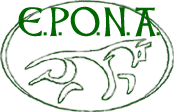|

On
Thursday January 13, 2003 CBS News released a
breaking story in the medical community. A Dr. Thomas
Guttuso prescribed the seizure medication
Neurotin to a patient of his that was experiencing
severe headaches. His patient a women who was also
going through menopause not only commented on the
success of the elimination of her headaches, but also
noted that it had dramatically decreased her hot
flashes as well. Dr. Guttuso's patient was not a
candidate for Premarin because of her previous
condition with breast cancer. Dr. Guttuso then
experimented a little on his own and prescribed
Neurotin to 59 of his patients experiencing
menopausal symptoms. All of the 59 women noted that
Neurotin that contains Gabapentin had either
eliminated or significantly reduced the number and
severity of their hot flashes. More research is now
underway to better determine if this is yet another
alternative to thousands of foals going off to
slaughter.
Jan-
Feb issue of Washington Monthly Report @ www.washingtonmonthly.com
look up an article titled Hot Flash /Cold Cash
written by Alicia Mundy

In addition to our general rescue and retirement
program, E.P.O.N.A. is committed to the
Premarin cause. We are not only committed to
the actual rescue of the foals and mares, but we are
also dedicated to the education aspect of informing
the general public about Premarin and the
alternatives that are available. As part of the
educational process we try to take opportunities like
this to show horse enthusiasts how wonderful these
foals are and the great tragedy that so many
thousands of these foals are sent to slaughter for an
unnecessary drug.
For those of you who are not familiar with Premarin,
it is the number one most prescribed drug in this
country. Many of you may recognize the name as
Premarin, Prempro, or HRT (Hormone Replacement
Therapy). Premarin is a horse estrogen that is
prescribed for menopausal symptoms. Thousands
of mares referred to as " Working Girls "
are impregnated on "Premarin farms" in the
Dakotas and in Canada. There are hundreds of such
farms in the northwestern US alone. The mare's
urine is collected throughout the pregnancy and
processed into pill form. Premarin stands for
Pregnant Mares Urine. Beginning the first of
September, the foals of these mares are rounded up,
much like our cattle roundups of the west, and are
herded, separated from their mothers and sent to
auction, oftentimes all in the same day. The
foals can be anywhere from two to six months old. The
majority of these auctions take place in Manitoba,
Canada, where the auctions run through the month of
October. Depending on whose numbers you
believe, thousands of foals go to slaughter every
year.
Manitoba, Canada, has been reported to be one of the
largest horse meat auction centers in the world.
Many of the foals sent to slaughter are used for
human consumption by the Japanese and European
markets, leather goods and of course dog food etc.
It is estimated with the increase in the number of
baby boomers reaching the menopausal age, and the
impact of mad cow disease in Europe, the demand for
Premarin and its by-product, the Premarin foals, will
reach an all-time high. Through our educational
efforts and our dedication to rescue as many foals as
possible and place them in appropriate homes, we hope
to make our effort a symbolic one. It is very
likely that the foals that are at our rescue center
today would have been sent to slaughter.
There are many safe and
effective natural alternatives to Premarin.
Many include plant-based synthetic alternatives,
diet, and exercise. It is interesting to note
that only about 10% of Asian and European women
experience menopausal symptoms, compared to 66% of
women here in the United States.
|

